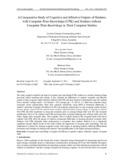Please use this identifier to cite or link to this item:
https://cris.library.msu.ac.zw//handle/11408/1630| Title: | A comparative study of cognitive and affective outputs of students with computer prior-knowledge (CPK) and students without computer prior-knowledge in their computer studies | Authors: | Chitanana, Lockias Musingarabwi, Starlin Maeresera, Jones |
Keywords: | Computer prior knowledge, Computer self efficacy, Cognitive outputs, Affective outputs, Computer skills | Issue Date: | 2011 | Publisher: | Canadian Center of Science and Education | Series/Report no.: | Journal of Educational and Developmental Psychology;Vol. 1, No. 1; | Abstract: | The study sought to establish the kind of computer prior knowledge (CPK) students in a teacher training college possessed before enrolling with college. It also analyzed the differences in students’ cognitive and affective outputs in their computer studies between students with CPK and those without it. Participants were 168 students from a teachers’ college (males = 63; females = 105; average age = 31; SD =6, 74). Data were collected using a structured survey questionnaire. Data were analyzed statistically using SPSS to determine differences in students’ perceived computer self–efficacy (CSE) and academic performance in their computer studies between the two groups. Almost half the students were computer illiterate before joining college. A majority of students with CPK had little experience in using the computers prior to joining college while very few had computer qualification. Most of the students with CPK possessed basic computer hardware and software skills and a few others, higher order computer skills. The computer CSE of students without CPK compared badly with that of students with CPK. Both the groups of students experienced difficulties in learning advanced computer skills. Students with CPK displayed better performance in computers than students without it in a statistically significant manner. Hence results of this study confirm the importance of computer prior knowledge. This has implications on policy for running computer courses with respect to grouping students, effecting differentiated instruction and strategies for dealing with students’ learning difficulties in the higher learning institution. | URI: | http://hdl.handle.net/11408/1630 | ISSN: | 1927-0526 |
| Appears in Collections: | Research Papers |
Files in This Item:
| File | Description | Size | Format | |
|---|---|---|---|---|
| A Comparative Study of Cognitive and Affective Outputs of Students.pdf | Full Text | 198 kB | Adobe PDF |  View/Open |
Page view(s)
82
checked on Feb 24, 2025
Download(s)
40
checked on Feb 24, 2025
Google ScholarTM
Check
Items in MSUIR are protected by copyright, with all rights reserved, unless otherwise indicated.



